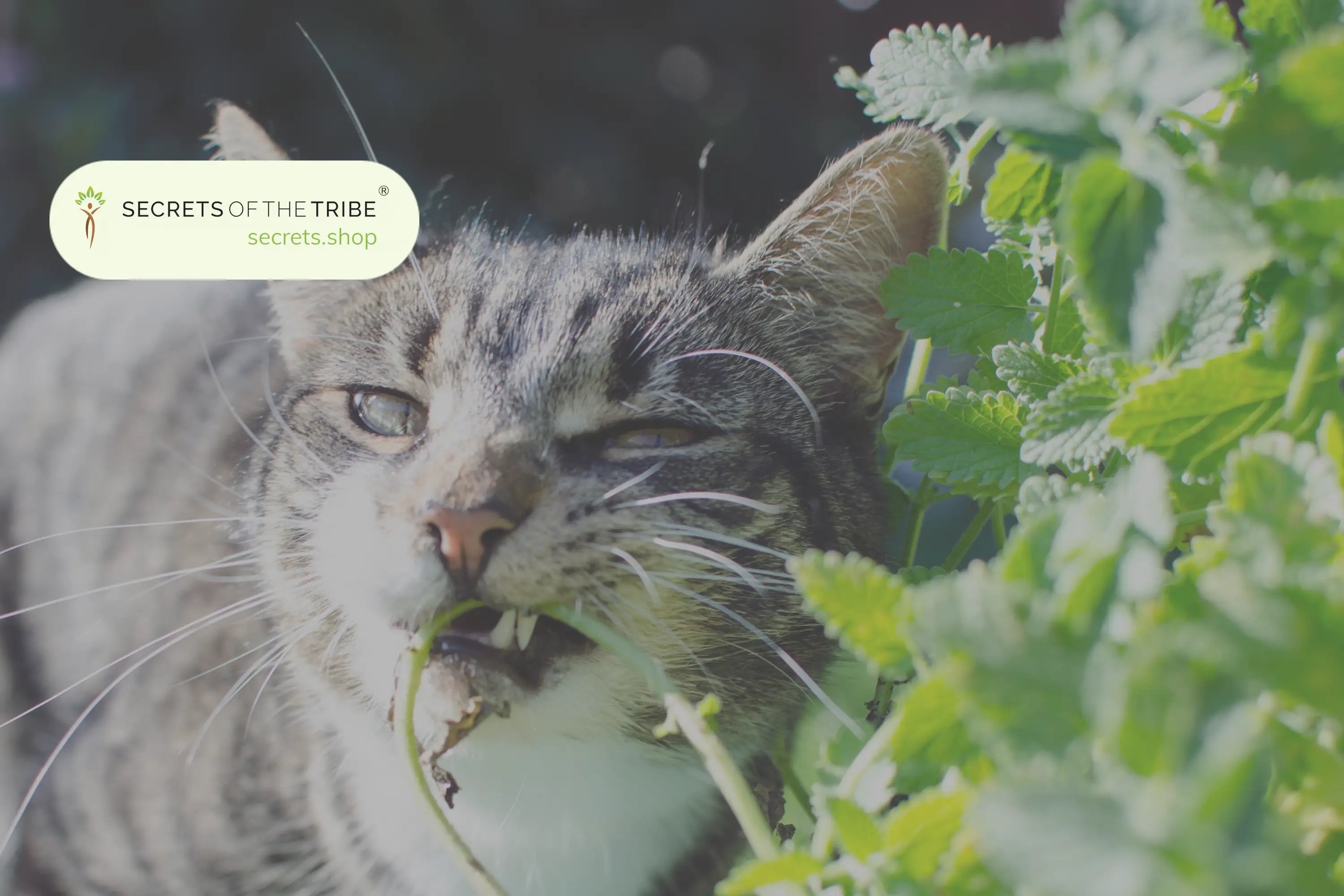Like their human companions, cats can also benefit from the healing properties of certain herbs when used appropriately. However, it's crucial to select only those herbs safe for cats, as many botanicals can be toxic or hazardous to them.
Essential oils, for instance, should never be used with cats because their delicate livers can't process phenols. Common herbs like pennyroyal, garlic, and cinnamon are also risky. Additionally, dosing requires extra caution due to your feline friend’s small size.
By contrast, some herbs have a long history of safe use in cats to gently address issues such as anxiety, respiratory problems, arthritis pain, hairballs, and more. These gentle botanicals work in harmony with a cat's unique physiology.
In this article, we'll explore the top herbs that are safe for cats along with their therapeutic benefits. We'll discuss calming herbs for anxious kitties, demulcents that safely alleviate hairballs, anti-inflammatories for joint pain, and immunostimulants to bolster defense against viruses and infections.
Discover how nature's pharmacy for pets can be used judiciously to promote your cat's health and comfort. With just a little know-how, certain herbs may provide the purrfect solution for your feline friend's needs.

Herbs for Reducing Anxiety
Just like humans, cats can experience anxiety, leading to distressed behaviors such as aggression, inadequate grooming, and urine marking. Fortunately, certain herbs can safely help relax and calm kitties without causing undesirable side effects.
Valerian root has been used since ancient times to alleviate anxiety and nervous tension. For cats, small amounts of valerian offer a mild, calming effect without sedation, releasing muscle tension and reducing stress.
The aptly named catnip contains nepetalactone, which binds to cat pheromone receptors, inducing a temporary euphoric state that relieves stress. Sniffing or eating catnip provides cats with an herbal way to manage anxiety.
Skullcap is another calming nervine herb that reduces restlessness and excitability. A small dose for cats inhibits adrenaline and motor activity stimulation, helping to minimize anxious behaviors. Its calming action helps cats relax.
Consult your veterinarian about occasional, proper dosing of herbs like valerian, catnip, and skullcap to safely alleviate an anxious kitty's concerns and restore a sense of calm.
Herbs for Handling Hairballs
Grooming keeps cats' coats healthy, but all that licking leads to swallowed hair that can accumulate in the digestive tract, forming uncomfortable hairballs. Fortunately, some demulcent herbs can safely lubricate the passage and soothe irritation.
Slippery elm contains mucilage that coats and lubricates the throat and esophagus when hairballs form. This helps soften dry hair clumps, allowing for easier passage through the gastrointestinal system and providing relief.
Similarly, marshmallow root's mucilaginous properties create a soothing gel that lubricates the throat when hairball obstructions occur. Its demulcent effects help reduce coughing and gagging, making swallowing easier.
Cat's claw is an herb traditionally used to support gastrointestinal health and digestion in both people and pets. For cats, it minimizes throat irritation from hairballs and facilitates easier elimination. It also helps reduce coughing and vomiting.
Talk to your vet about proper dosages of demulcent herbs safe for cats which can be mixed into food. With botanical aids, cats can overcome the discomfort of hairballs.
Herbs Safe for Cats’ Joint Health
Like humans, aging cats can develop joint pain and arthritis, affecting their mobility and quality of life. Natural anti-inflammatory herbs offer safe relief by reducing inflammation and discomfort.
Turmeric contains the potent anti-inflammatory compound curcumin. Veterinary studies confirm turmeric's ability to significantly reduce arthritis-associated pain and lameness in cats, while also supporting joint health.
Yucca root has anti-inflammatory and analgesic effects. Pet owners have safely used yucca for years to alleviate arthritis and keep cats mobile and active. Its saponins help block pain pathways.
Celery seed contains antioxidant flavonoids that reduce inflammation and can minimize joint swelling and stiffness. Studies indicate that celery seed extracts inhibit inflammatory enzymes like COX-2.
Consult your vet about appropriate dosages of anti-inflammatory herbs that can be mixed into food or treats. Providing arthritis relief in a safe manner helps cats remain playful and content.
Herbs Safe For Cats Immune Boost
Cats can benefit from herbal support just like humans when it comes to enhancing immune defenses against pathogens. Some feline-safe botanicals even address and shorten the duration of ailments.
Astragalus root has a long history in traditional Chinese medicine for boosting immunity. It activates white blood cells and stimulates interferon production to enhance the body's infection-fighting capacity.
Echinacea is a potent immunomodulator that has been used for centuries to combat colds, flu, and infections. Studies confirm that echinacea increases the production of lymphocytes and macrophages, which target invading microbes to fight off feline infections.
Goldenrod contains anti-inflammatory and antimicrobial compounds that are ideal for addressing upper respiratory issues in cats. Its flavonoids clear nasal congestion, while saponins help expel mucus and pathogens from the lungs and sinuses.
Discuss with your veterinarian the appropriate use of immune-enhancing herbs to help keep your cat healthy. With trusted botanical allies, cats can triumph over common pathogens.
Conclusion
While many herbs are unsafe for feline companions, select botanicals can provide effective yet gentle relief when used judiciously and under veterinary guidance.
Anxious kitties can benefit from mild calming herbs like valerian, catnip, and skullcap to ease stress and nervous behaviors. Demulcent herbs such as slippery elm can relieve coughing and gagging caused by troublesome hairballs. Anti-inflammatory herbs, including turmeric, yucca, and celery seed, can reduce joint pain and keep aging cats active. And astragalus, echinacea, and goldenrod offer immune-boosting protection.
Always consult your veterinarian before administering any herb to your cat, and follow their dosage directions carefully. Partner with your vet to explore whether herbs safe for cats could be the perfect natural solution for your feline friend's needs.




Share:
Pros and Cons of Dry Pet Food and Natural Food
Holistic Help for Hounds: What Herbs Are Good for Dogs' Health?